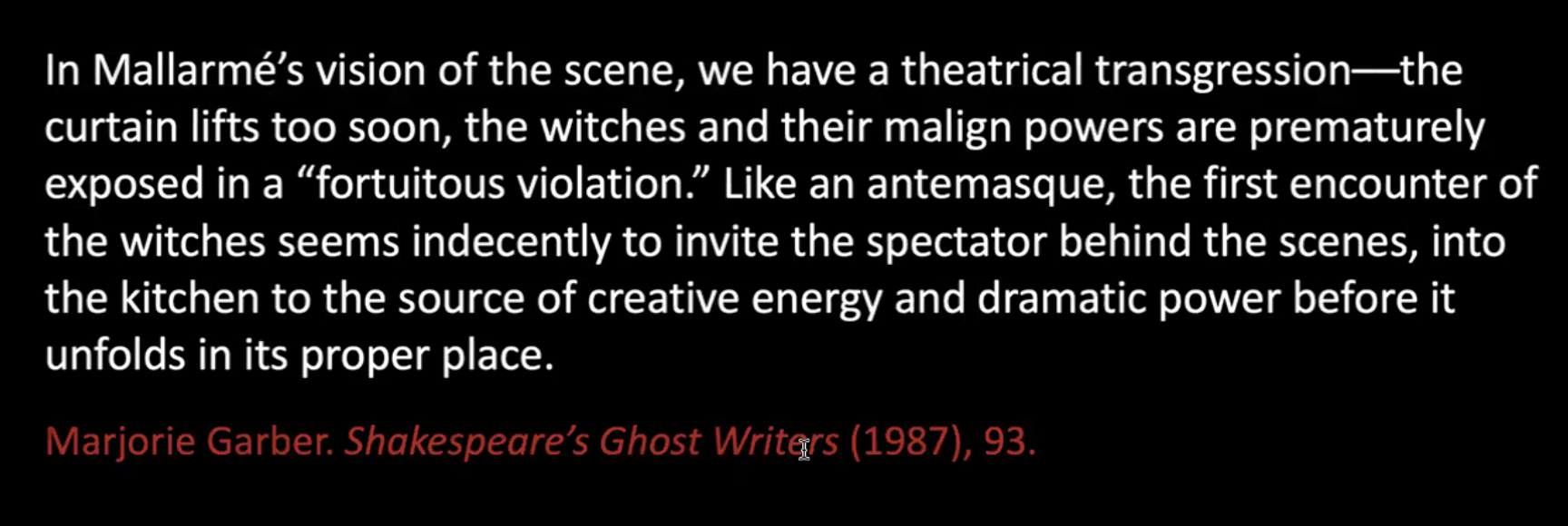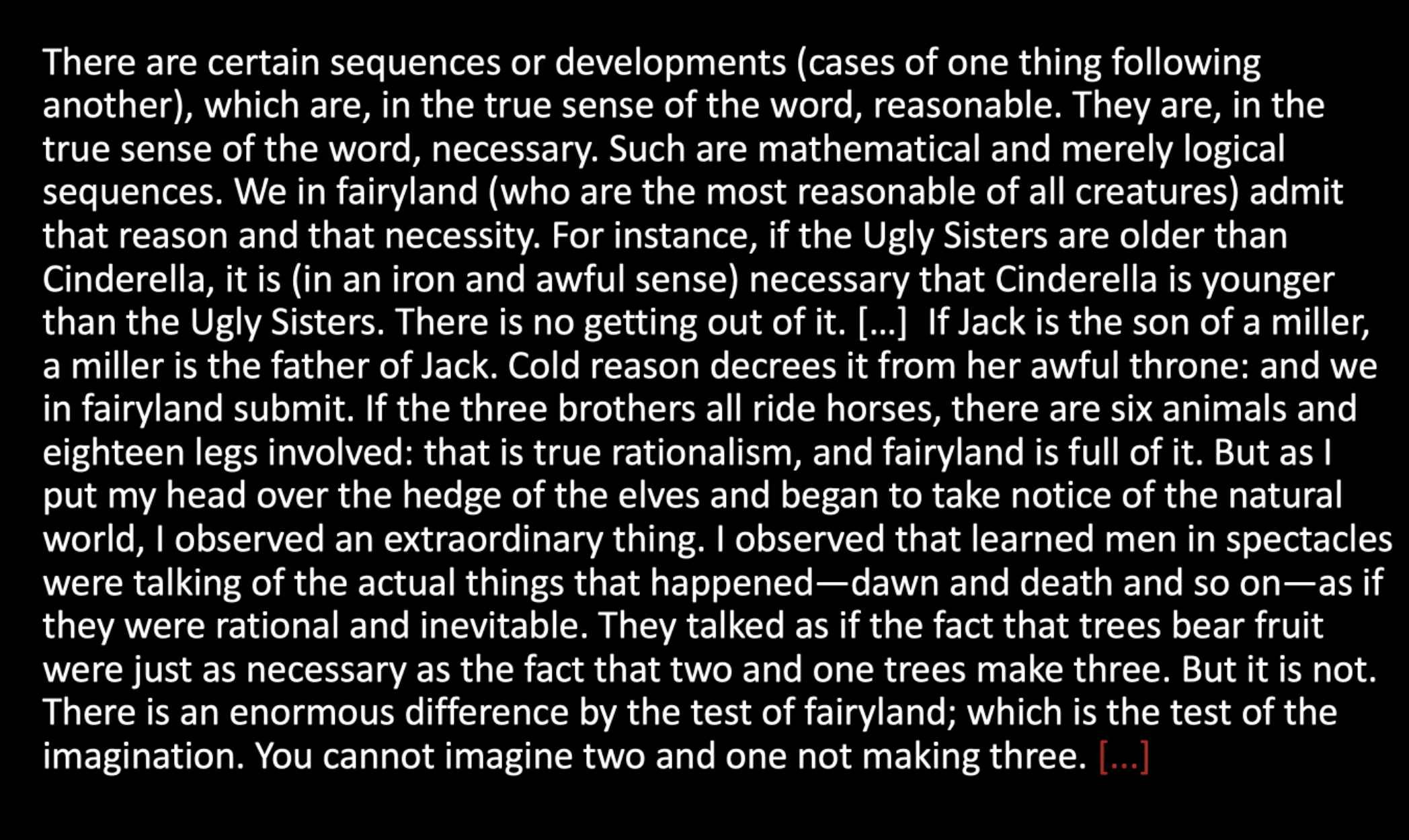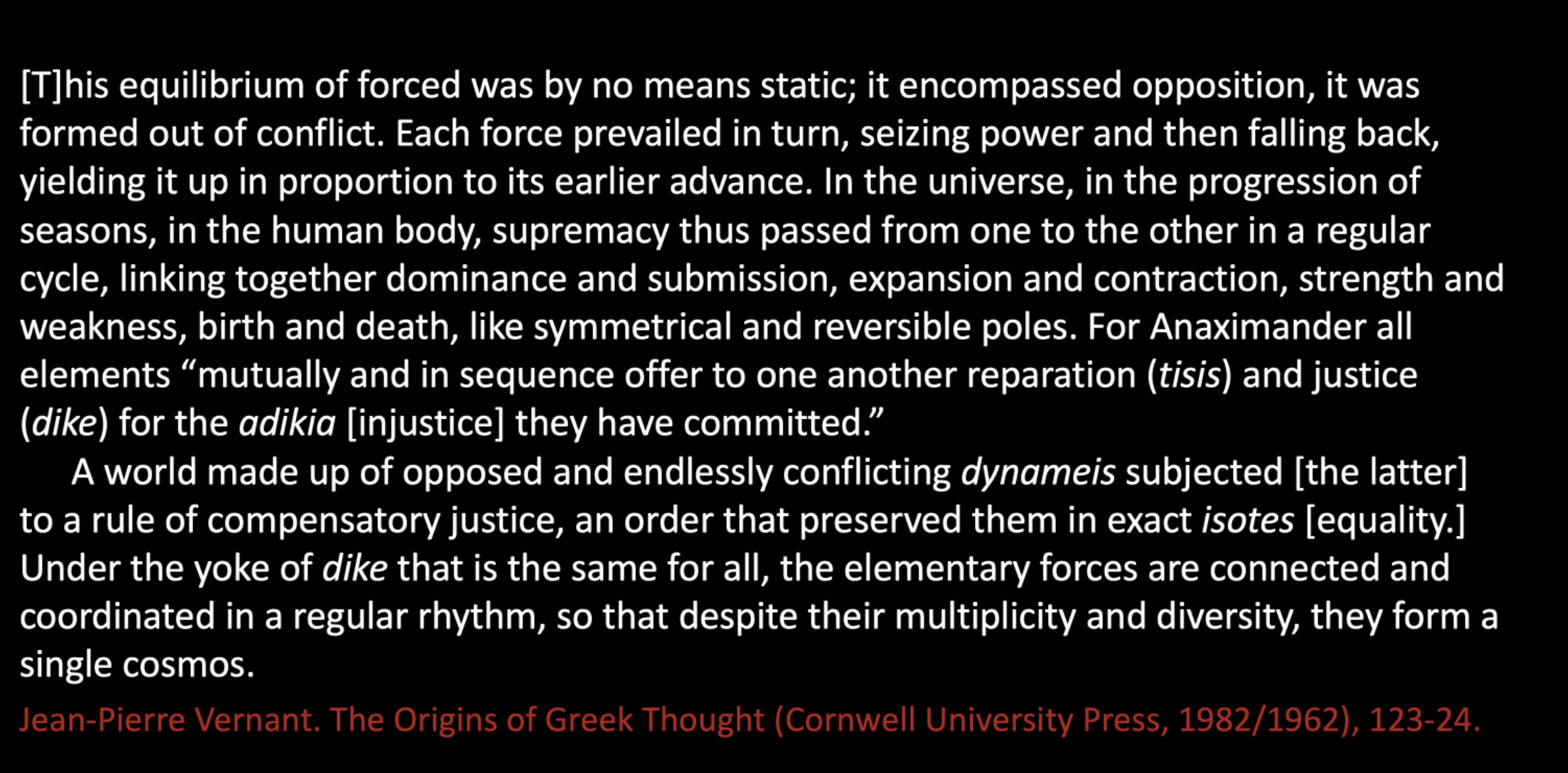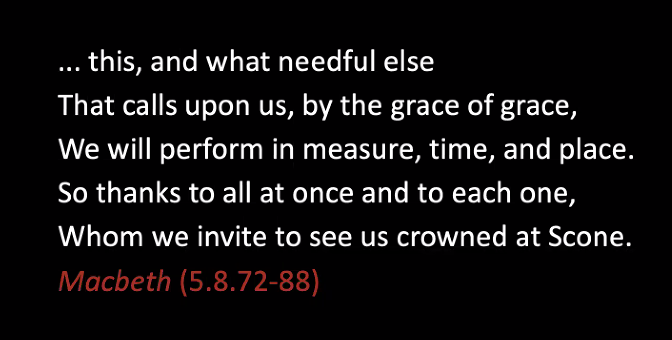Weird Studies/Courses/Macbeth
25 Jun 2024 - 10 Jan 2025
- Notes on Macbeth with J.F. Martel
Other Readings
- See Macbeth Macbeth/Bibliography, Weird Studies/Cutting (Patreon), Weird Studies/Up and Over (Patreon), Weird Studies/Let It Come Down (Patreon)
- Come and Go, Beckett (time and modernity)
Session 1 Mar 14th, 2023
- Shakespeare and the Weird
- S as original weird writer, precursor to Lovecraft etc.
- Soaked in magic, that we moderns think doesn't exist
- Me: why do we care what Shakespeare's real metaphysical views were? He was an artist, not a philosopher or theolgian.
- "There are more things in heavan and earth that are deamt of in your philosophy" – OK
- Means both fate and deviant from order (wayward)
- Shakespeare's ghostwriters, by Marjorie Garber? Harvard "Macbeth is a play that refuses to be contained with the bounds of fiction" – thus a magical working
- The Rift (as essential component of artwork)
- Jung: relation of anlaytical psych to poetry (naive vs sentimental)
- Macbeth describing a reality, not just the imaginal (think I might argue with this, or at least, what it is implying)
- Blake as decadent?
- Alan Moore, culture turned liquid
- Macbeth and Metaphysical Transgression
- Themes: time, the weird, death of god, nature of evil, ecstasy (mentioned twice), and most importantly: cuts
Office Hours 1 (Sunday)
- whirld – a ferment – birth – vortext
- Jaci: feels scriptural because of the rifts
- JFM: scripture – we need them for reality – to penetrate to heart of things
- He listened religiously as a teenager – realizing I was antireligous as a teenager
- JFM: 3 forms of movement or time: turning, cutting, flow.
- Threes are unstable, fours are stable
Lec 2
- Time (postponed) so instead: equivocation
- implied metaphysics (starting with his groundwork course)
- which I haven't done, feel like I'm missing something
- aura of supernatural power, play is cursed, because it is something of a spell (he doesn't use that term). Not a mere allegory.
- Shakespeare not only believed in supernatural, but transmutes them into new thing...ED says witches are womb of the modern weird.
- Old wyrd: Fate – no longer the inscrutable will of gods but something about forces that elude semantic capture.
- He's constantly arguing for the reality of the supernatural and the inadequacy of rationalism. I go about halfway with that.
- Replacement of gods by "mystrious forces that elude semantic capture" (not sure what that is meant to imply)
- stage metaphor, Shakespeare literalizes (not sure what that means)
- Bottom's Dream quote – dream without a dreamer. Speech: Bottom's Dream by William Shakespeare | Poetry Foundation
- radical mystery – this is a major JFM idea
- interesting quote from Holinshed (shakespeare historical source)
- Witches: Jacobean witchcraft and feminine power
- Witchcraft somehow connects feminine activity to state power (?)
- James was Banquo's descendent so owes his kingship to black magic.
- JFM: modern weird is just as magical but much less knowable.
- The plays subject is the weird, the transgressive...it weirds us, in that attunes us to the dreamlike nature of reality: rifts
- hypnotic quality, all these ideas swirling and pooling...life goes liquid...nothing to hold onto.
- essay "macbeth and metaphysical evil" should check that out
- Milton, Blake precursors of the satanic qualities, evil be though my good...decadent art (is that really the right term) beautous malignity
- the soul must be made monstrous

- thus: art reveals some aspects of reality, real discoveries (and Macbeth is such) Picasso quote about Art is a lie that makes us realize truth.
- A work of art is more than itself.
- Art splits things, it is saying two things at once, Magritte pipe example. That is equivocating.
- Gunpowder plot, equivocation, how Catholics could lie and tell the truth simultaneously (huh did not know about this at all). Jesuits out of Aristotle
- Article "Macbeth and the background of jesuitical equivocation"
- The play equivocates with equivocation (it mentions explictly ikn many places)
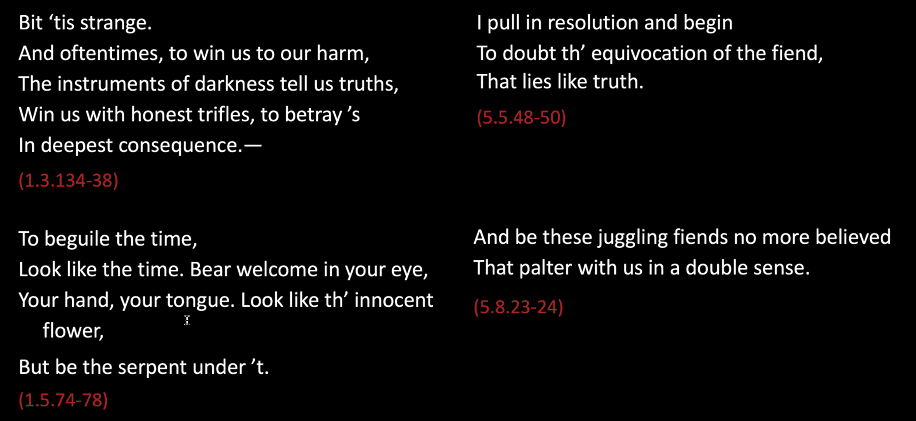
- God doesn't care about modality (thought or speech etc), and thus imagination or reality are the same (to god). Jung unus mundi, world before split of mind and matter.
- language is magical, and also (because metaphor) always equivocal (no argument there but ok so what)
- doubling of doubling (occurs in many places)
- As far from artifice as you can get (ref his book)
- He didn't like Coen abstract dreamworld set, for plausible reasons. You want the union of imaginal and material.
- The imaginal is the basic blah. Reality is imaginal, the causal world is an instance of the imgainal...ho hum. Hes going to go over this nex ttime
- In the material world it is never really night (?) Night in a dream is absolute, not this messy vague space of reality... night in dream contains opposite...ok so what...things are never confused in dreams.
Office Hours 2 (Sunday, recording)
- equivocation – the confusion is in particulars, not universals? No idea, but his example is fair and foul – they don't cease to be real categories, but individual things can oscillate between them. Hm. For some reason I want to fight with that but I can't even say why.
- NOT perspectivalism. Sigh, I feel there's some tendentious philosophy goal here and it's not so much that I want to fight it, but it bores me, I suspect it is a waste of mental energy.
- it's never more urgent to know than when you can't know.
- Registers of sense, x could be fair in some sense and foul in another.
- The fair and foulness of politics. He's against it, it's a flattening of sense (in that if something is foul you don't have to experience it).
- Feel like I could make a violent argument here.
- The play itself is foul in some aspects. "A tale told by an idiot". Complicity.
- 2nd guy: map and territory. Any dichotomy is really a triad (A, B, A+B) not sure what that has to do with anything. Cantorian mathematics. JFM very confused about set theory, although maybe not at the important level. Mention of GS Brown.
- This is fine as "stoned rap" sorts of conversation, I'm not sure it would pass in my version of academia. But why not?
- JFM: Monsters important at this time (Descartes). I sign from outside the knowable. The cut that opens the dyad onto a triad.
- Rimbeau: the poet must make himself monstrous
- Jaci: starting from the end. Macbeth in tune with nature in a Hermetic MotT sense (?). He is a kind of mirror, open to forces. JFM: Bloom's book on Macbeth. Deleuze-Bergson-Matter and Memory - his idea also is outside mind/matter seesaw (!). Where is the personality of a character. Shakespeare, characters who can't act (Hamlet and Macbeth).
- Jaci: Nature magic vs perfect magic . Crowlean magick entirely masculine control, Tomberg hints at cooperative form of magic(?). Macbeth as Scotland personified.
- Karlolina: you need structure for equivocation(?). Sandman reference (to the Diner horrorshow with Dr. Destiny(?)
- Act 4 Scene 3 scene with Malcolm:
- That which you are, my thoughts cannot transpose. Angels are bright still, though the brightest fell. Though all things foul would wear the brows of grace, Yet grace must still look so.
- Apollonian aspect of play (opposed to obvious D qualities)
- Alex: British comics: imaginal breaking into the real, a constant theme. Equivocation and cuts (cinematic) in Watchmen, V for Vendetta begins with Macbeth quote.
- JFM on Moore's politics (oneiric). From Hell – modern born from Ripper's caesearian cuts on reality.
- The Tempest (LXG) – might reread that
- JGM against modern interp of Macbeth in terms of agency(!) (Emma Smith at Oxford) because of pluralityh of powers. People did nto really believe in unitary agency back then. Macbeth feels like modern porous self, an emergent self. Banquo's ghost speech. Now, modernity is the haunted time.
- Kevin: language as infection, witches infect macbeth, play script infects actors.
- Why is Shakespeare so good (an answer in Sandman!)
- JFM: the irrationality or rationalism (H bombs etc)
Lec 3 Time in Macbeth
- Last week: Shakespeare as prophet of modern weird; equivocation; indiscernability
- not nominalism but realism
- time crystal when the indiscernability of categories reveals itself (???). Confusion belongs to the material world; in the imagination images have limpidity and defniteness (?). Night and day example (seems very confused to me), Midnight and noon as privelgeed points of manifestation (even more confused). So: dreams are not confused and opaque, that's the material world.
- Course argument: the real includes not just phenomenal but also the imaginal realm, where every possibility is already real. Actual possibilities, who are objective through the act of imagining (I don't know, sounds fucking confused). Manticore example. If you can imagine it, then MAYBE it existrs.
- Being is a subset of maybe-ing.
- Sounds like “Everything to be imagined is an image of truth.” ― William Blake
- Dinosaurs and dragons (also fucking confused)
- The imaginal is peripheral....
- The class as imaginal event (future) exerting a force on JFM in the present. OK no problem with that. When class is over, it goes back to the imaginal.
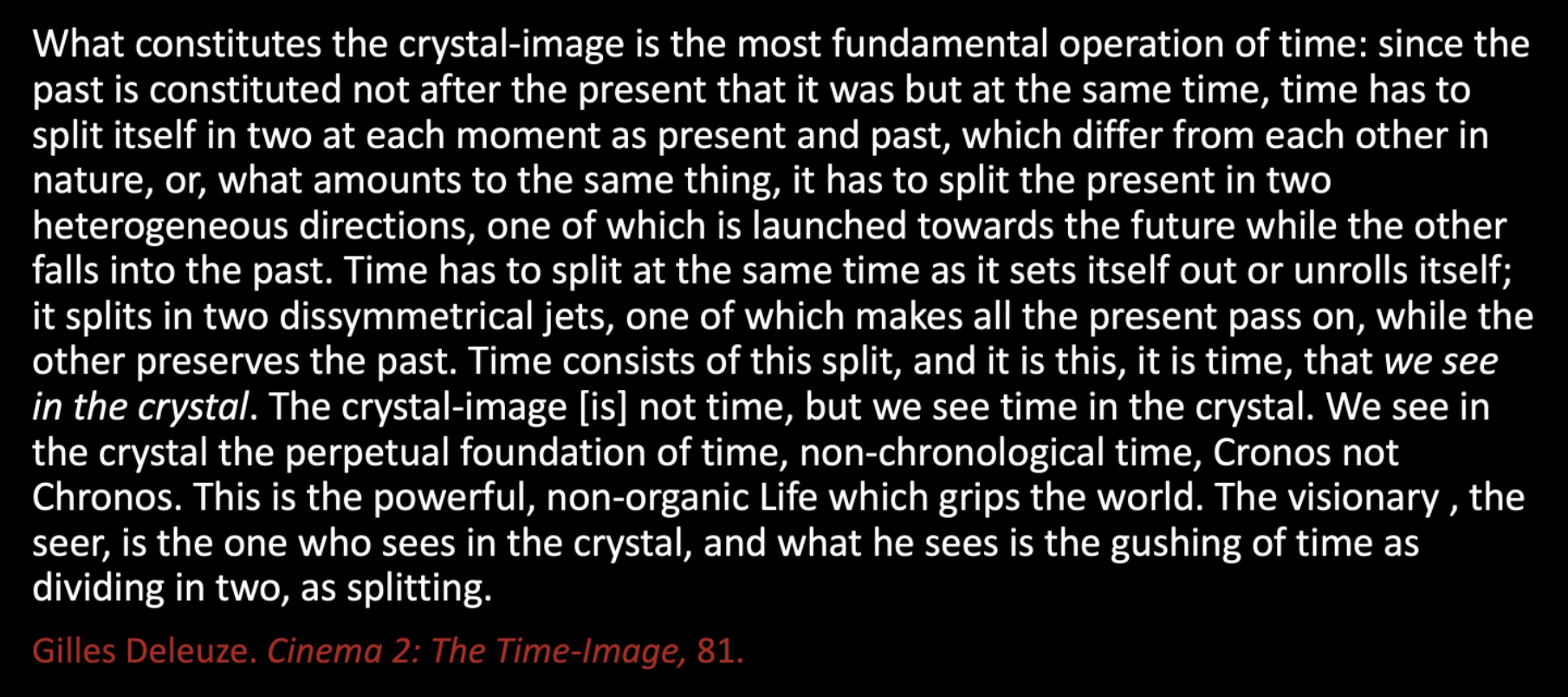
- visionary is implicitly outside of time, observing it from a vantage, not embedded within at as ordinary people are.
- time is the cut, Now is the Knife (I made that one up)
- acausal time cut hyperchaos
- hesiod's theogony
- we are always already in the imaginal....
Office Hours 3
- last tue was "originary time" -- bits of Deleuze and other usual suspects
- Five forms of time, a multiplicity but Deleuze had a handle on the primal form. Witches as time crystal.
- ordinary time. paradox of the present (always past when you point at it) Bergson: accept the paradox of time, it is both past and present at the same time? ????
- All this discourse presumes a point-experiencer which isn't real.
- originary time has no laws (???). It's not clock time...seems confused. The knife of time makes sense for lived experience, imagination doesn't work that way?
- Dan Haar: Brings up frazier, eliade, saturnalia...Macbeth as king of saturnalia, prerisded over period of lawlessness.
- JFM: a spiral, not a flat circle, and presided over by the gods.
- He says Macbeth undoes circularity, dialectic structure....
- Capitalism as an ontology of time. Marx CMC...vs Capitalism MCM (vague antisemitism thing). MCM' Marx resorts to occult language. Damn this feels stupid. No more cyclicality -- this is modernity. All cycles are contingent (as opposed to ancient world where they seemed fixed).
- Kevin Lincoln: Nolan films playing with time.
- Babak: played the play. Hecate enters and berates the witches. Opens with a scene outside of time. DIfferent metrical scheme for witches...poetry is rhythm is time. Bergson...poets have naive view of time (?).
- JFM: Macbeth has killed Kingship, he's not really king. no center to things.
- Karolina: ripeness and time. intensity (also found in Deleuze and Bergson ?). Repeated Ligeti notes in Eyes Wide Shut.
Lec 4
- More on time
- originary time, time as cut, gushing forth...acausally
- Heidegger – who is time? No time without a who (theism?) Aligned with Kant(?) In Macbeth, the three witches are the who of time.
- "the charm's wound up" – a machinery set in motion.
- Time of the witches, primordial, underneath ordinary time
- ordinary or natural time.
- cauaslity is in ordinary time, this lower time is acausal. Hume on causation (I think he's full of it)
- Something very crappy about this, I can't quite figure out what.
- Time does not produce, it mirculates (from Deleuze)
- Dan Haar recommends Rovelli Order of Things
- Shakespeare didn't produce play like phlegm; causal language in art is dumb. It involves decisions (cuts)
- He is wrong but I don't have energy to argue
- Shakespeare;s characters are not aware of him as creator, he is outside the causal order but creates that order.
- Shakespeare's castle could just appear (OK but WHY SHOULD THAT IMPLY ANYTHING ABOUT REAL PHYS CASTLES)
- imaginary and real 5:48 argh drives me crazy.
- all possibles are real does not mean all exist, or else we'd be in determinist universe? WTF?
- The future insists in the present (exerts a pull???)
- He explictly states the goal, the imaginal as being somehow prior to the real.
- Eidolon, self-existing images, the main things. Not idealism or materialism, but something else. (OK)
- "We are such stuff as dreams are made of" –
- Jacob Foster: I’m a big fan of Rovelli, but I think Nicolas Gisin comes closer to JF’s sense of time. If I recall, Rovelli views time as emergent and epiphenomenal, whereas folks like Gisin or Lee Smolin view time as fundamental and — at least in Gisin’s case — generative, “deciding” the present through fundamental stochastic events. .
- A 20-sided die that always hits 20 because causality is BS or something. Argh. None of this makes sense.
- Theogonies, primal chaos split into opposite. The Origins of Greek Thought, Vernet(?). War between agents. Anaximander, beginning of phiilosophy, replaces warring gods with neutral elements. No room for chaos.
- Christianity, making desert god take charge of the whole enchilada. Working towards Answer to Job. Psalm 89, sudden turning against god.
- Around 1000 (where historical Macbeth appears) the whole edifice begins to groan, the inner contradcitons are too much (of Greek/Jewish conflicting god models).
- Montaigne "On a Monster Child", siamese twins on tour,
- In Macbeth, world falls from Cosmos to Chaos (OK).
- Subtle Knife riff. In Macbeth daggers are doubled quite often. Imagine dagger and Real dagger form a time crystal.
- Killing the king vs. killing kingship (order) itself, a deicide. Murder of the Christian god-image after 1600 years when it was getting stale. 1040 is just in the middle of the Age of Pisces (Christian Aeon in Jung).
Office Hours 4 (Thu)
- 5 kinds of time. Time Crystal question. Why crystal? Deleuze actually used terms from crystallography (?). Regular pattern suggests reflection and mirroring. Seed or originary event plus environment. Part of theory of individuation.
- Nathan: semantic attractors. "Nonlinear" means roughly magical (butt that's a good thing, in this context). Meaning as a potential in space.
- JFM and he agree that materialism-idealism split is kinda dumb. OK.
- Nathan has some theory about how magic works in terms of these attractors, which sounds quasi-naturalist to me, at least, more so than JFMs.
- JFM complaining people say you "can't go past Kant", not sure what that mesans.
- Rec: Bergson, Matter and Memory, Ch 1 ("pure immanence" according to Deleuze, along with Spinoza).
- Freud: Cubism: Macbeth and Lady Macbeth as faces of as single person
Lec 5
- Nothing is but what isnot
- Werner Ceuters, hyporealization and hyperrealizstion (philosopher of psychosis)
- why 2 daggers? because 2 murders (king, god)
- Time is out of joint (Hamlet, earlier)
- Answer to Job – Jung as literary critic. Yahweh as an unconscious character
- Echo of Duncan. blood scene Nietzsche Gay Science
Office Hours 5
- Circularity vs linearity. Charles Taylor, immanent frame, modernity...
- The nature of evil. JFM: innately chaotic elements of the world, the witches represent this. Jung calling for a post-christian view that acknowledges the reality of evil within us (in Aion). 1 fish 2 fish good fish bad fish. Duncan only sees one side, misses evil.
- Dan B: Simone Weil, Gravity and Grace
- JFM: Nietzsche is polyphonus (and so am I).
- Macbeth and Job comparison...
- Ross speech "modern ecstaay"
- The jewel in the toad – the treasure is where you don't want to look. The stone that the builders refused, the Freudian unconscious....
- Nathan: reading Job in the Hebrew, different names of God, Jobs faith was to Elohim not Yahweh.
- Jung has a dualistic reading of a polytheistic text
- JFM: Jung is very poly, Yahweh is just an archetype of self...Hillman didn't like wholeness(?).
- Nathan: ancient cosmologies say there is one point where one god became boss...
A Note on Forms of Time
- I had a strange negative reaction to this. Not sure why! Before I analyze it, let me make my own version:
- Physical time – objective, clock time, the dimension of the universe
- Experiential time – time as we experience it – an immediate but unknowable Now, past as memory and future as projection. Activity and routines.
- Narrative time – time as it occurs in fictions and representations. Once upon a time. Has plot points and beats and such. Overlaps with experiential time to the extent that experience has a narrative structure (see Against Narrativity )
- Those are my big 3, might also separate out clock/calendar time (a human discrete number system that attempts to capture and subordinate physical time). Improv time, free time, meditation time, life time (that is where birth, death, and life stories fit in). Musical time.
Lec 6
fissile core of Macbeth
- Deleuze post-Hiroshima cinema – a kind of existential paralysis. Ecstasy/paralysis
a cinema of the seer, not of the agent (actant)
- Macbeth claims to sovereiginty, replacing god
- Self-proclaiming power, paradoxical, equivocal...
- God is dead, Azathoth lives
- Evental time – like chthonic time because equivocal (???)
- but evental time is divine as opposed to satanic (??????)
- He means the equivocation of "brook" and a brook...I think...
- the fuck?
- the sixties as atemporal autonomous zone...
- The tiny cycle of times emergence from moment to moment, the last surviving cycle...wtf? not causal, it has a cut, it just occurs....oh god this is braindamage shit....the creative moment of the universe is now.
- radical freedom and hope (???) originary time doesn't have to give us a trustworthy order, but we do have knowledge, oh blah this stuff is dumb.
- grace of grace (not grace of god)
- Parmenides...pure immanence...acausal x can do anything, but it doesn't...gratitude only to agents...oh yeah the three sisters become the three graces! Forgot about that.

